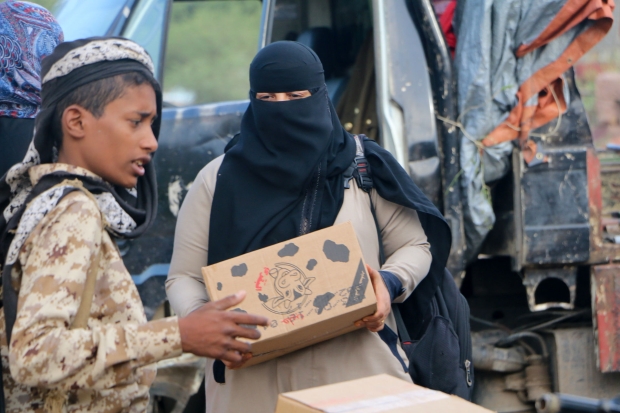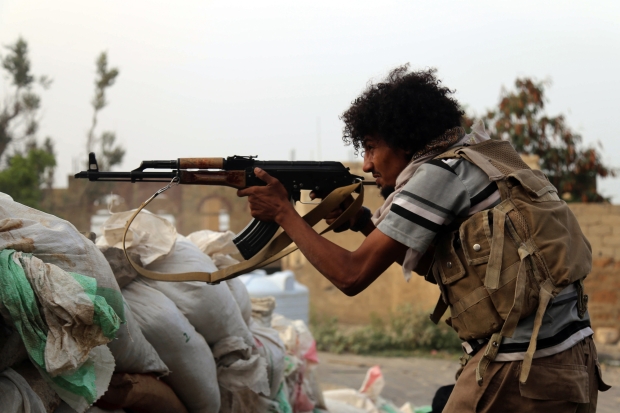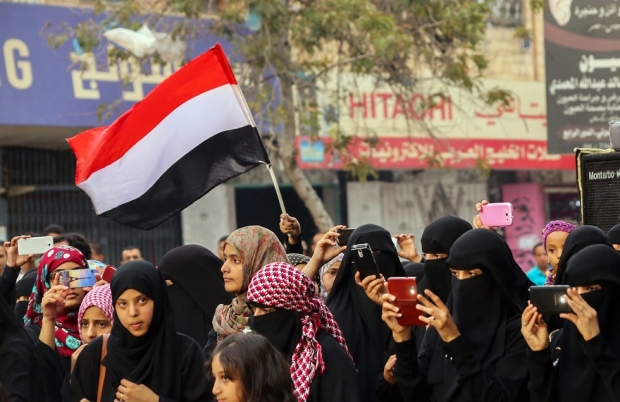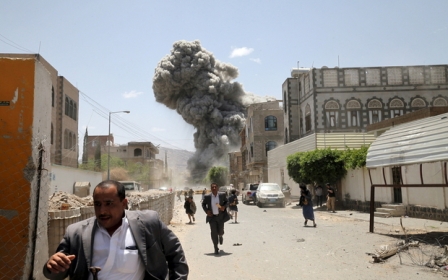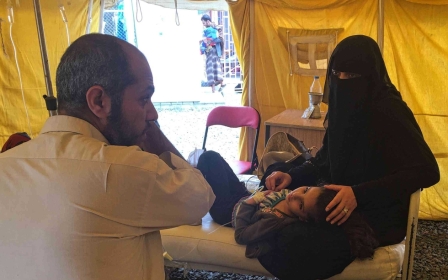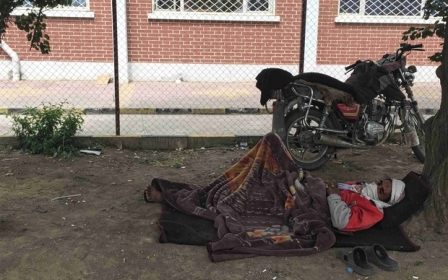Yemeni women keep engines of war rolling in battle for Taiz
TAIZ, Yemen – After five hours in the dugout, hiding from the sights of Houthi fighters, Naseem al-Odaini, a Yemeni woman, was finally able to emerge and flee to safety.
But she had not found herself there by accident. Odaini, 27, routinely delivers supplies of food and water to the frontlines, helping the pro-government fighters fuel up in order to fend off Houthi advances.
'After five hours in the tunnel, the resistance fighters began to return fire, and we used that as an opportunity to flee'
- Naseem al-Odaini
Criticised by the religious establishment, and challenging social norms, a group of Yemeni women insist it is their duty to put themselves in harm's way.
Three months ago was the closest she has yet come to death, she says, while delivering supplies to the frontline in Thaabat, just east of Taiz, where Odaini is from.
"The Houthi snipers started to shoot at us," she tells MEE, "so we hid in a tunnel for five hours.
"We had been distributing the food to fighters."
"After five hours in the tunnel, the resistance fighters began to return fire, heavily, and we took our chance to flee."
"I could not believe that I was able to flee the Houthi snipers," she says, proudly.
Naseem is one of five women who support fighters on the front lines as part of a pro-resistance collective called "Love It".
It is a dangerous pursuit - Yemen has been at war since early 2015, when a Saudi-led coalition launched a military campaign against the Iranian-allied Houthi rebels.
In Taiz province, the anti-Houthi resistance finds itself fighting alongside the local al-Qaeda branch, AQAP, among others.
The war has killed at least 8,000 people, and wreaked untold destruction on the country's infrastructure and health services; a cholera epidemic has killed 1,500 people.
Odaini and those like her are acutely aware their work puts them in danger, but it is a sacrifice they are willing to take.
'I could not believe that I was able to flee the Houthi snipers'
- Naseem al-Odaini
They have no military training, and eschew combat fatigues for traditional Yemeni dress. She says she does not see the need to wear camouflage.
"We chose this work precisely because it is not easy, and if we don't do it, no one will.
"Sometimes when we are distributing food, the clashes arrive near us, so we are forced to hide," she said.
"We have seen injured people near us on more than one mission to the front."
A different life
Odaini has a degree in marketing, and used to work with a local health organisation. But when the war broke out in 2015, she lost her job, and with four other unmarried women, all supporters of the resistance, set up Love It.
The project is designed to provide fighters and civilians in need in pro-government areas with food, water and medical supplies, and prioritises those living in conflict zones, and fighters on the front lines, she says.
"We want to encourage the pro-government forces to advance in the province, by raising the spirits of the fighters," Odaini said.
"We want to help build a new country which respects and implements the rule of law."
Odaini's family fled towards Ibb and Sanaa in the early days of the war, in May 2015, but she was determined to stay behind in Taiz with her brother to help support the residents in any way she could, even if it was dangerous. She views her work as a necessity.
"After my cousin was killed in a Houthi shelling, my family fled the city and my mother was so worried about me that I did not leave the city, but I did not tell her the truth about my work," says Odaini.
When Odaini did finally tell her relatives about the nature of her work, they were initially concerned for her wellbeing, but eventually became supportive, and have started to donate to the initiative.
The project depends on support from pro-government philanthropists and the women then use the money to buy produce from the market, and then cook the meals themselves at home, before delivering them to the front lines.
Reham Badr, also in her 20s, is another member of the pro-government collective.
Before the war broke out, and she lost her job, Badr was working with a local aid organisation in Taiz.
On 23 March, her brother was killed while fighting in the battle for the al-Tashreefat camp, east of Taiz.
For her, activism is the bare minimum she could be doing to support the anti-Houthi resistance.
"We should participate in the liberation of our city," she tells MEE. "This is the least that we can give to our city," she says, adding that she has now grown used to witnessing clashes on her trips to the front line.
Raising morale
Quite aside from tangible support, Badr and her friends believe that lifting the spirits of the fighters is even more important, something the fighters reiterated to MEE.
"The women activists do not just provide us with food and water, but they provide a boost to morale," one member of the pro-government forces in Taiz city told MEE.
"When we see women arrive at the front lines, we insist on letting them hear good news about how the battles are progressing."
He has seen the women activists at most of the fronts he has participated in around Taiz, and pointed out that there are some men helping them, but that they are being led by the women.
Badr confirmed that sometimes men help bring food to the front lines, but they are not main members of the initiative.
"When we see the women on the frontlines, we try to keep them safe, advising them to avoid the dangerous areas and keep the food far from the frontlines.
"I am surprised to see such brave women."
This fighter was involved in the clashes three months ago on the Thaabat front, in which Odaini and her friends were forced to hide for hours from sniper fire, and says he helped get them to safety.
"When the women started to distribute the food, the Houthis launched a sniper attack against our positions," he recalls.
'We live in a conservative society that cannot accept women in such work, so it is better to let men do this work'
- Naef Nouradeen, Yemeni social expert
"After more than five hours of shooting back at the snipers, my comrades launched a heavy attack against the Houthis, so we were then able to take the women through a tunnel to a safe area."
Local academic and expert on social norms at the education office in Taiz, Naef Nouradeen, says that while the participation of women on the frontlines may raise the spirits of the fighters, it contradicts Yemeni traditions.
"We live in a conservative society that cannot accept women in such work, so it is better to let men do this work," he tells MEE.
It would be better, he says, if women simply carried out the cooking.
Facing criticism
Some local Islamic clerics have also forbidden the work of such women, but the Love It members are happy to ignore such fatwas.
Ahmed al-Hanani, the imam of the al-Suna Mosque in Taiz, tells MEE that Islam allows women the privacy to retain her femininity, dignity and virtue, and that all Muslims are expected to follow the instructions of Islam.
"Islam is not against nature, and it is irrational to see women on the frontlines, so this is against Islam," he says.
"This work puts women in danger and they cannot face difficulties in the same way that men can, so I advise women to give up such work."
"I myself am against the work of women on the frontlines and I think that any rational person would agree with me."
'This work puts women in danger and they cannot face difficulties in the same way that men can, so I advise women to give up such work'
- Ahmed al-Hanani, imam of the al-Suna Mosque in Taiz
Hanani stated that people have to work for the sake of Allah in their lives as this life is mortal, confirming that Islam forbids women to go out to remote areas without a man.
Odiani says she has become accustomed to such fierce criticism, and she is now able to ignore it, as her aim is more important than replying to such attacks.
"We receive criticisms from inside Yemen and abroad but we ignore them and work normally as if we did not hear anything because we do not have enough time to reply," Odaini adds.
"We will continue with our humanitarian work until the liberation of the whole province."
Middle East Eye propose une couverture et une analyse indépendantes et incomparables du Moyen-Orient, de l’Afrique du Nord et d’autres régions du monde. Pour en savoir plus sur la reprise de ce contenu et les frais qui s’appliquent, veuillez remplir ce formulaire [en anglais]. Pour en savoir plus sur MEE, cliquez ici [en anglais].


